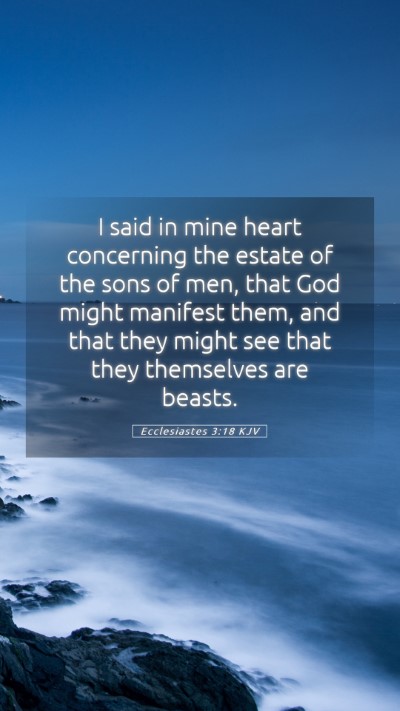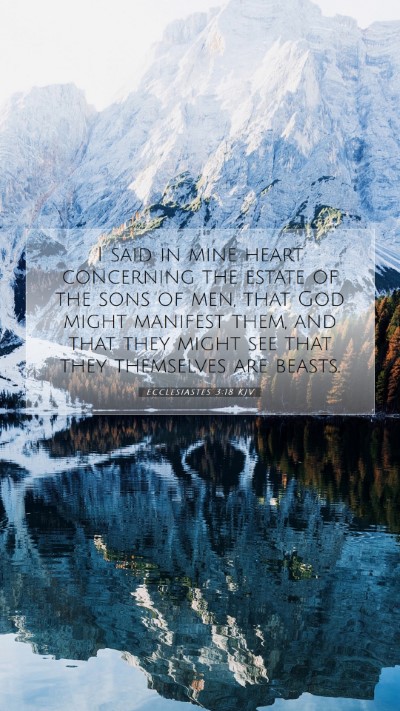Understanding Ecclesiastes 3:18
Ecclesiastes 3:18 is a profound verse that delves into the nature of humanity in relation to the divine purpose. The verse states: "I said in mine heart concerning the estate of the sons of men, that God might manifest them, and that they might see that they themselves are beasts." This passage offers valuable insights into human existence, the inevitability of mortality, and the overarching sovereignty of God.
Verse Meaning and Interpretation
In this section, we summarize the commentaries by notable theologians such as Matthew Henry, Albert Barnes, and Adam Clarke, providing a well-rounded understanding of Ecclesiastes 3:18.
-
Matthew Henry:
Henry emphasizes the comparison between humanity and beasts, highlighting the shared fate of all living beings. He reflects on the idea that, despite mankind's status as rational creatures, their end is often aligned with the animal kingdom. This serves as a reminder of human mortality and the futility of pride.
-
Albert Barnes:
Barnes discusses the implications of God's intention in revealing human nature, suggesting that it is a call for humility. He posits that the acknowledgment of our beast-like qualities leads to a deeper understanding of our dependence on God’s grace and a recognition of our moral responsibilities.
-
Adam Clarke:
Clarke explores the existential themes presented in this verse, noting that it challenges individuals to confront the realities of life and death. He interprets the term "beasts" in a metaphorical sense, indicating that humans, when living without godly wisdom, can descend to a life driven purely by instincts and earthly desires.
Key Themes
The key themes in Ecclesiastes 3:18 include:
- The Nature of Humanity: Reflecting on the primal aspects of human existence.
- Mortality: The inevitability of death that unites all living beings.
- Divine Purpose: Understanding that God reveals the nature and condition of humanity for a purpose.
- Humility and Reflection: Encouraging believers to ponder their existence in relation to God.
Practical Applications
This verse calls for several practical applications in daily life and Bible study:
- Encouragement for Reflection: Taking time to reflect on our lives and our ultimate destiny.
- Fostering Humility: Recognizing our limitations and the need for God in our lives.
- Engaging in Bible Study: Utilizing this verse as a springboard for deeper theological discussions in Bible study groups.
In-depth Bible Verse Analysis
Understanding Ecclesiastes 3:18 involves an examination of its historical context, literary structure, and theological implications. The Book of Ecclesiastes is traditionally attributed to King Solomon, known for his wisdom. This background provides a rich perspective on the complexity of human thoughts about life, purpose, and death. The philosophical nature of Ecclesiastes often leads to discussions about the meaning of life, making it relevant for both personal study and group studies.
Cross References
Ecclesiastes 3:18 is commonly cross-referenced with the following Bible verses:
- Psalm 49:12 - "Nevertheless man being in honor abideth not: he is like the beasts that perish."
- Genesis 3:19 - "For dust thou art, and unto dust shalt thou return."
- James 4:14 - "For what is your life? It is even a vapor that appeareth for a little time, and then vanisheth away."
Conclusion
Ecclesiastes 3:18 serves as a poignant reminder of our human condition and the divine purpose behind our existence. By engaging with the insights from public domain commentaries, individuals can gain a deeper appreciation for the scriptures' teachings. Whether in personal study or group discussion, this verse is an excellent starting point for exploring the complexities of life, mortality, and the role of divine providence in human affairs.


